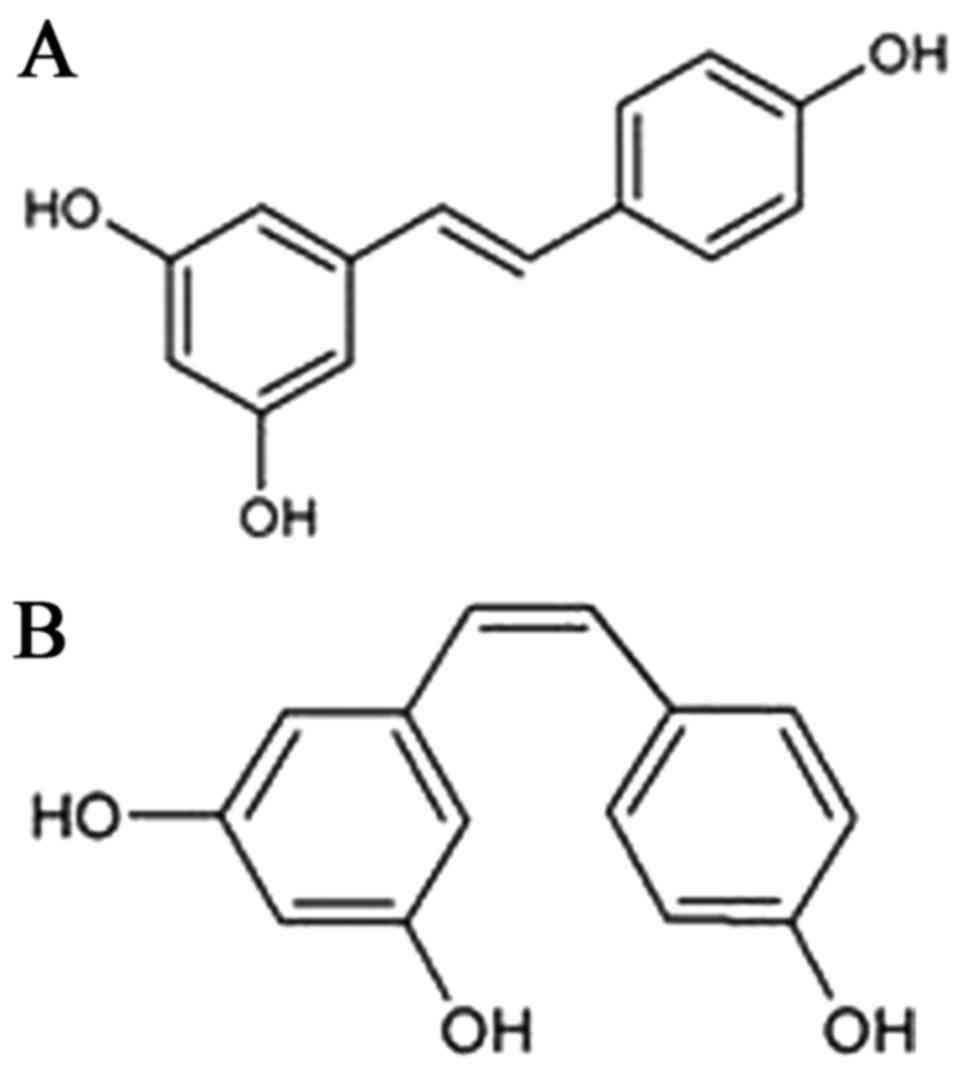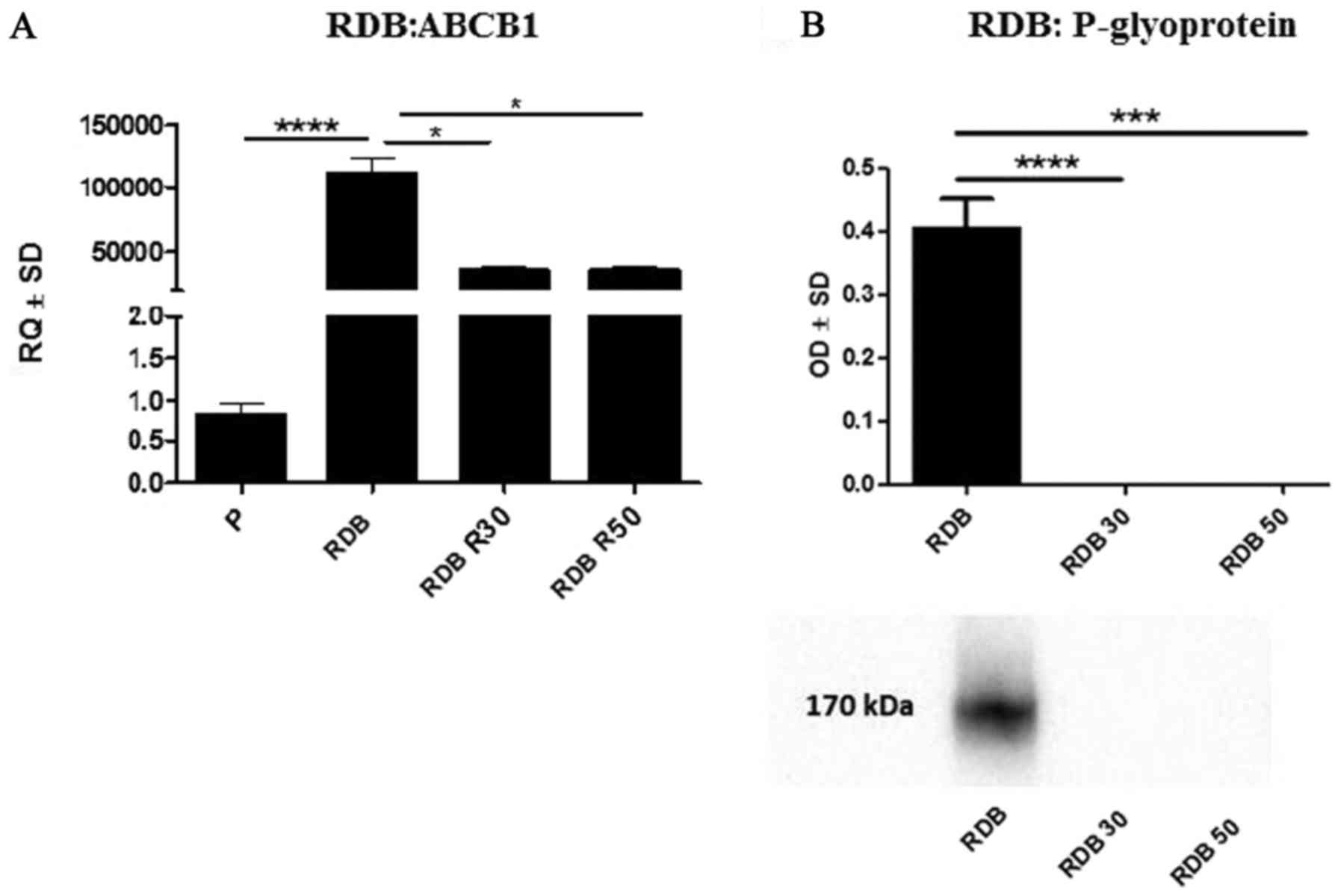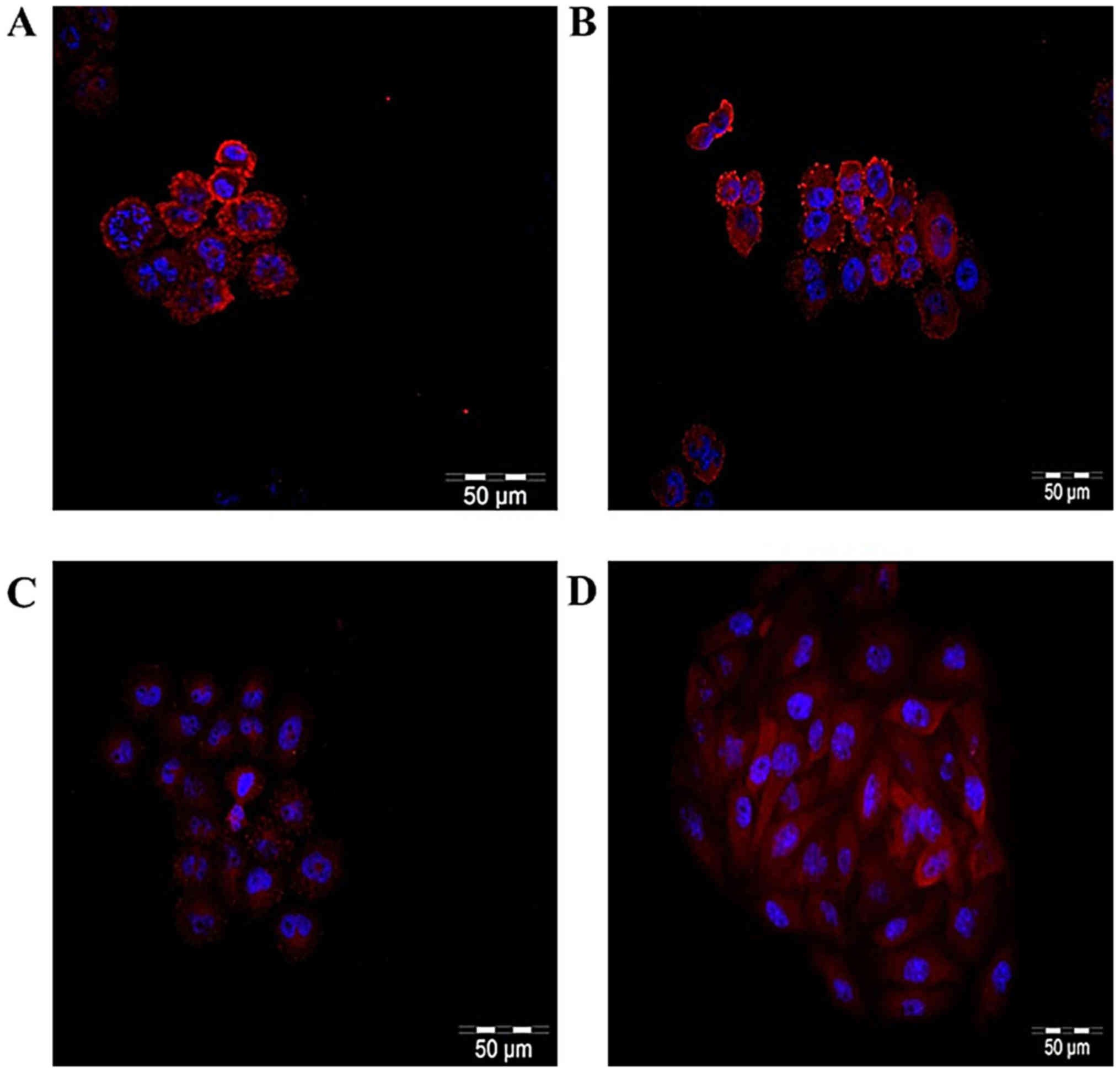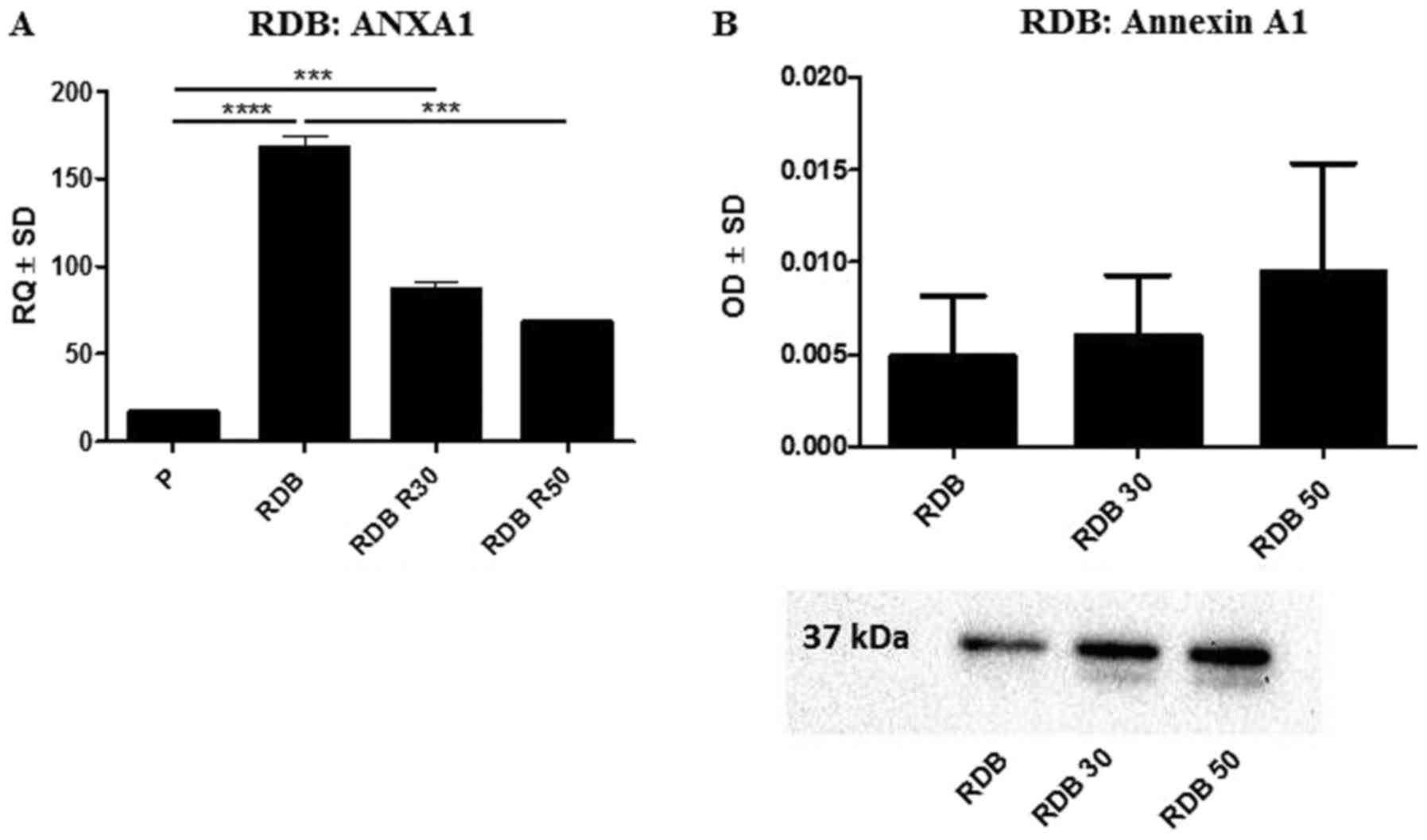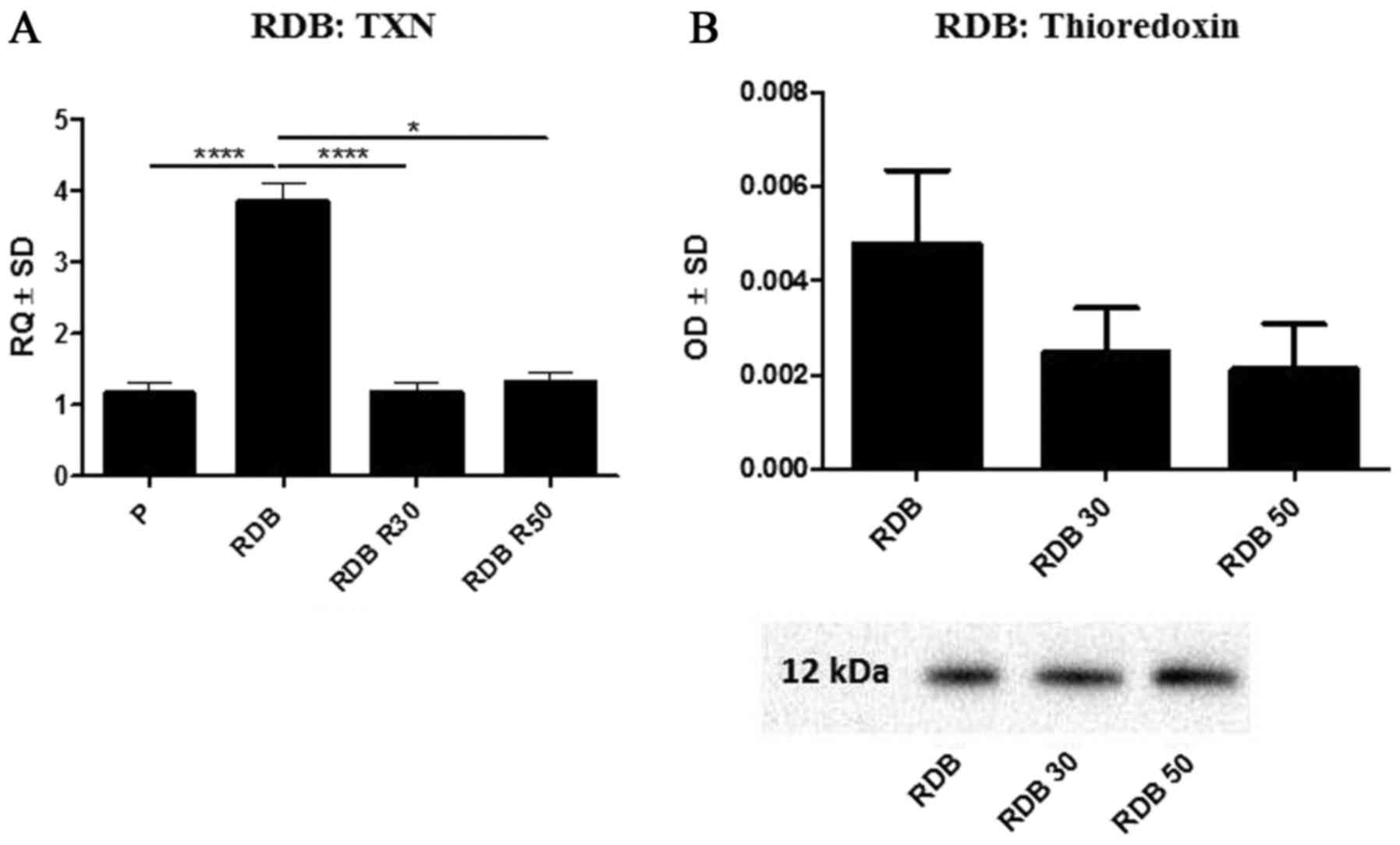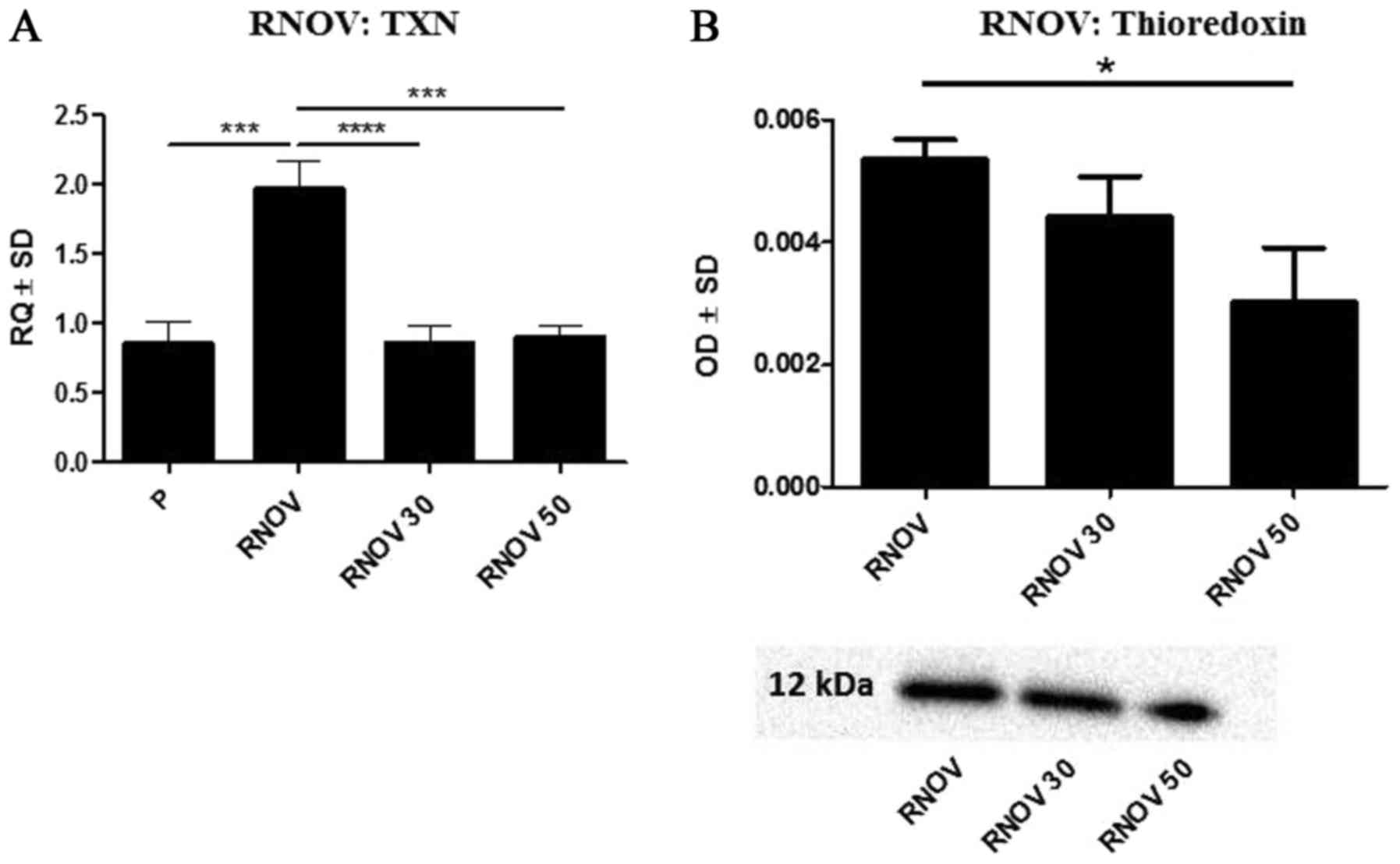|
1
|
Tomé-Carneiro J, Larrosa M,
González-Sarrías A, Tomás-Barberán FA, García-Conesa MT and Espín
JC: Resveratrol and clinical trials: The crossroad from in vitro
studies to human evidence. Curr Pharm Des. 19:6064–6093. 2013.
View Article : Google Scholar : PubMed/NCBI
|
|
2
|
Nakata R, Takahashi S and Inoue H: Recent
advances in the study on resveratrol. Biol Pharm Bull. 35:273–279.
2012. View Article : Google Scholar : PubMed/NCBI
|
|
3
|
Gupta C and Prakash D: Phytonutrients as
therapeutic agents. J Complement Integr. 11:151–169. 2014.
|
|
4
|
Athar M, Back JH, Kopelovich L, Bickers DR
and Arianna L: Multiple molecular targets of resveratrol: Anti
carcinogenic mechanisms. Arch Biochem Biophys. 486:95–102. 2010.
View Article : Google Scholar
|
|
5
|
Aguirre L, Fernández-Quintela A, Arias N
and Portillo MP: Resveratrol: Anti-obesity mechanisms of action.
Molecules. 19:18632–18655. 2014. View Article : Google Scholar : PubMed/NCBI
|
|
6
|
Sinha D, Sarkar N, Biswas J and Bishayee
A: Resveratrol for breast cancer prevention and therapy:
Preclinical evidence and molecular mechanisms. Semin Cancer Biol
40–41. 1–232. 2016.
|
|
7
|
Rodríguez-Cabo T, Rodríguez I, Ramil M and
Cela R: Comprehensive evaluation of the photo-transformation routes
of trans-resveratrol. J Chromatogr A. 1410:129–139. 2015.
View Article : Google Scholar : PubMed/NCBI
|
|
8
|
Trollope L, Cruickshank DL, Noonan T,
Bourne SA, Sorrenti M, Catenacci L and Caira MR: Inclusion of
trans-resveratrol in methylated cyclodextrins: Synthesis and
solid-state structures. Beilstein J Org Chem. 10:3136–3151. 2014.
View Article : Google Scholar : PubMed/NCBI
|
|
9
|
Lançon A, Michaille JJ and Latruffe N:
Effects of dietary phytophenols on the expression of microRNAs
involved in mammalian cell homeostasis. J Sci Food Agric.
93:3155–3164. 2013. View Article : Google Scholar : PubMed/NCBI
|
|
10
|
Jang M, Cai L, Udeani GO, Slowing KV,
Thomas CF, Beecher CW, Fong HH, Farnsworth NR, Kinghorn AD, Mehta
RG, et al: Cancer chemopreventive activity of resveratrol, a
natural product derived from grapes. Science. 275:218–220. 1997.
View Article : Google Scholar : PubMed/NCBI
|
|
11
|
Liu T, Liu X and Li W: Tetrandrine, a
Chinese plant-derived alkaloid, is a potential candidate for cancer
chemotherapy. Oncotarget. 26:40800–40815. 2016.
|
|
12
|
Gilmore TD and Herscovitch M: Inhibitors
of NF-kappaB signaling: 785 and counting. Oncogene. 25:6887–6899.
2006. View Article : Google Scholar : PubMed/NCBI
|
|
13
|
Liu Y, Li Q, Zhou L, Xie N, Nice EC, Zhang
H, Huang C and Lei Y: Cancer drug resistance: Redox resetting
renders a way. Oncotarget. 7:42740–42761. 2016.PubMed/NCBI
|
|
14
|
Kartal-Yandim M, Adan-Gokbulut A and Baran
Y: Molecular mechanisms of drug resistance and its reversal in
cancer. Crit Rev Biotechnol. 36:716–726. 2016.PubMed/NCBI
|
|
15
|
Nieth C, Priebsch A, Stege A and Lage H:
Modulation of the classical multidrug resistance (MDR) phenotype by
RNA interference (RNAi). FEBS Lett. 545:144–150. 2003. View Article : Google Scholar : PubMed/NCBI
|
|
16
|
Abdallah HM, Al-Abd AM, El-Dine RS and
El-Halawany AM: P-glycoprotein inhibitors of natural origin as
potential tumor chemo-sensitizers: A review. J Adv Res. 6:45–62.
2015. View Article : Google Scholar : PubMed/NCBI
|
|
17
|
Wu CP and V Ambudkar S: The
pharmacological impact of ATP-binding cassette drug transporters on
vemurafenib-based therapy. Acta Pharm Sin B. 4:105–111. 2014.
View Article : Google Scholar : PubMed/NCBI
|
|
18
|
Kapse-Mistry S, Govender T, Srivastava R
and Yergeri M: Nanodrug delivery in reversing multidrug resistance
in cancer cells. Front Pharmacol. 5:1592014.PubMed/NCBI
|
|
19
|
Borska S, Chmielewska M, Wysocka T,
Drag-Zalesinska M, Zabel M and Dziegiel P: In vitro effect of
quercetin on human gastric carcinoma: Targeting cancer cells death
and MDR. Food Chem Toxicol. 50:3375–3383. 2012. View Article : Google Scholar : PubMed/NCBI
|
|
20
|
Karthikeyan S, Hoti SL and Prasad NR:
Resveratrol modulates expression of ABC transporters in non-small
lung cancer cells: Molecular docking and gene expression studies.
Cancer Sci Ther. 6:497–504. 2014.
|
|
21
|
Chen Z, Shi T, Zhang L, Zhu P, Deng M,
Huang C, Hu T, Jiang L and Li J: Mammalian drug efflux transporters
of the ATP binding cassette (ABC) family in multidrug resistance: A
review of the past decade. Cancer Lett. 370:153–164. 2016.
View Article : Google Scholar : PubMed/NCBI
|
|
22
|
Levatić J, Ćurak J, Kralj M, Šmuc T, Osmak
M and Supek F: Accurate models for P-gp drug recognition induced
from a cancer cell line cytotoxicity screen. J Med Chem.
56:5691–5708. 2013. View Article : Google Scholar : PubMed/NCBI
|
|
23
|
Lopes-Rodrigues V, Seca H, Sousa D, Sousa
E, Lima RT and Vasconcelos MH: The network of P-glycoprotein and
microRNAs interactions. Int J cancer. 15135:253–263. 2014.
View Article : Google Scholar
|
|
24
|
Belvedere R, Bizzarro V, Forte G, Dal Piaz
F, Parente L and Petrella A: Annexin A1 contributes to pancreatic
cancer cell phenotype, behaviour and metastatic potential
independently of Formyl Peptide Receptor pathway. Sci Rep.
6:296602016. View Article : Google Scholar : PubMed/NCBI
|
|
25
|
Gao Y, Chen Y, Xu D, Wang J and Yu G:
Differential expression of ANXA1 in benign human gastrointestinal
tissues and cancers. BMC Cancer. 14:5202014. View Article : Google Scholar : PubMed/NCBI
|
|
26
|
Wang Y, Serfass L, Roy MO, Wong J, Bonneau
AM and Georges E: Annexin-I expression modulates drug resistance in
tumor cells. Biochem Biophys Res Commun. 314:565–570. 2004.
View Article : Google Scholar : PubMed/NCBI
|
|
27
|
Powis G, Mustacich D and Coon A: The role
of the redox protein thioredoxin in cell growth and cancer. Free
Radic Biol Med. 29:312–322. 2000. View Article : Google Scholar : PubMed/NCBI
|
|
28
|
Reuter S, Gupta SC, Park B, Goel A and
Aggarwal BB: Epigenetic changes induced by curcumin and other
natural compounds. Genes Nutr. 6:93–108. 2011. View Article : Google Scholar : PubMed/NCBI
|
|
29
|
Borska S, Owczarek M, Pedziwiatr M,
Gomulkiewicz A, Pula B and Dziegiel P: (unpublished report): In
vitro studies of pleiotropic effects of resveratrol on cancer cells
resistant to cytostatics. Wisla. 2014.
|
|
30
|
Livak KJ and Schmittgen TD: Analysis of
relative gene expression data using real-time quantitative PCR and
the 2(-Delta Delta C(T)) method. Methods. 25:402–408. 2001.
View Article : Google Scholar : PubMed/NCBI
|
|
31
|
Laemmli UK: Cleavage of structural
proteins during the assembly of the head of bacteriophage T4.
Nature. 227:680–685. 1970. View Article : Google Scholar : PubMed/NCBI
|
|
32
|
Moitra K: Overcoming multidrug resistance
in cancer stem cells. Biomed Res Int. 2015:6357452015. View Article : Google Scholar : PubMed/NCBI
|
|
33
|
Kunjachan S, Rychlik B, Storm G, Kiessling
F and Lammers T: Multidrug resistance: Physiological principles and
nanomedical solutions. Adv Drug Deliv Rev. 65:1852–1865. 2013.
View Article : Google Scholar : PubMed/NCBI
|
|
34
|
Long S, Sousa E, Kijjoa A and Pinto MM:
Marine natural products as models to circumvent multidrug
resistance. Molecules. 21:E8922016. View Article : Google Scholar : PubMed/NCBI
|
|
35
|
Lopes-Rodrigues V, Di Luca A, Sousa D,
Seca H, Meleady P, Henry M, Lima RT, O'Connor R and Vasconcelos MH:
Multidrug resistant tumour cells shed more microvesicle-like EVs
and less exosomes than their drug-sensitive counterpart cells.
Biochim Biophys Acta. 1860:618–627. 2016. View Article : Google Scholar : PubMed/NCBI
|
|
36
|
Borska S, Pedziwiatr M, Danielewicz M,
Nowinska K, Pula B, Drag-Zalesinska M, Olbromski M, Gomulkiewicz A
and Dziegiel P: Classical and atypical resistance of cancer cells
as a target for resveratrol. Oncol Rep. 36:1562–1568. 2016.
View Article : Google Scholar : PubMed/NCBI
|
|
37
|
Lu JJ, Cai YJ and Ding J: The short-time
treatment with curcumin sufficiently decreases cell viability,
induces apoptosis and copper enhances these effects in
multidrug-resistant K562/A02 cells. Mol Cell Biochem. 360:253–260.
2012. View Article : Google Scholar : PubMed/NCBI
|
|
38
|
Eid SY, El-Readi MZ, Eldin EE, Fatani SH
and Wink M: Influence of combinations of digitonin with selected
phenolics, terpenoids, and alkaloids on the expression and activity
of P-glycoprotein in leukaemia and colon cancer cells.
Phytomedicine. 21:47–61. 2013. View Article : Google Scholar : PubMed/NCBI
|
|
39
|
Wang Z, Zhang L, Ni Z, Sun J, Gao H, Cheng
Z, Xu J and Yin P: Resveratrol induces AMPK-dependent MDR1
inhibition in colorectal cancer HCT116/L-OHP cells by preventing
activation of NF-κB signaling and suppressing cAMP-responsive
element transcriptional activity. Tumor Biol. 36:9499–9510. 2015.
View Article : Google Scholar
|
|
40
|
Quan F, Pan C, Ma Q, Zhang S and Yan L:
Reversal effect of resveratrol on multidrug resistance in KBv200
cell line. Biomed Pharmacother. 62:622–629. 2008. View Article : Google Scholar : PubMed/NCBI
|
|
41
|
El-Araby ME, Omar AM, Khayat MT, Assiri HA
and Al-Abd AM: Molecular mimics of classic p-glycoprotein
inhibitors as multidrug resistance suppressors and their
synergistic effect on paclitaxel. PLoS One. 12:e01689382017.
View Article : Google Scholar : PubMed/NCBI
|
|
42
|
Li G, He S, Chang L, Lu H, Zhang H, Zhang
H and Chiu J: GADD45α and annexin A1 are involved in the apoptosis
of HL-60 induced by resveratrol. Phytomedicine. 18:704–709. 2011.
View Article : Google Scholar : PubMed/NCBI
|
|
43
|
Alldridge LC and Bryant CE: Annexin 1
regulates cell proliferation by disruption of cell morphology and
inhibition of cyclin D1 expression through sustained activation of
the ERK1/2 MAPK signal. Exp Cell Res. 290:93–107. 2003. View Article : Google Scholar : PubMed/NCBI
|
|
44
|
Solito E, de Coupade C, Canaider S,
Goulding NJ and Perretti M: Transfection of annexin 1 in monocytic
cells produces a high degree of spontaneous and stimulated
apoptosis associated with caspase-3 activation. Br J Pharmacol.
133:217–228. 2001. View Article : Google Scholar : PubMed/NCBI
|
|
45
|
Debret R, El Btaouri H, Duca L, Rahman I,
Radke S, Haye B, Sallenave JM and Antonicelli F: Annexin A1
processing is associated with caspase-dependent apoptosis in BZR
cells. FEBS Lett. 546:195–202. 2003. View Article : Google Scholar : PubMed/NCBI
|
|
46
|
Sinha P, Hütter G, Köttgen E, Dietel M,
Schadendorf D and Lage H: Increased expression of annexin I and
thioredoxin detected by two-dimensional gel electrophoresis of drug
resistant human stomach cancer cells. J Biochem Biophys Methods.
37:105–116. 1998. View Article : Google Scholar : PubMed/NCBI
|
|
47
|
Karlenius TC and Tonnisen KF: Thioredoxin
and cancer: A role for thioredoxin in all states of tumor
oxygenation. Cancers (Basel). 2:209–232. 2010. View Article : Google Scholar : PubMed/NCBI
|
|
48
|
Li C, Thompson MA, Tamayo AT, Zuo Z, Lee
J, Vega F, Ford RJ and Pham LV: Over-expression of Thioredoxin-1
mediates growth, survival, and chemoresistance and is a druggable
target in diffuse large B-cell lymphoma. Oncotarget. 33:314–326.
2012.
|
|
49
|
Tonissen KF and Di Trapani G: Thioredoxin
system inhibitors as mediators of apoptosis for cancer therapy. Mol
Nutr Food Res. 53:87–103. 2009. View Article : Google Scholar : PubMed/NCBI
|
|
50
|
Saitoh M, Nishitoh H, Fujii M, Takeda K,
Tobiume K, Sawada Y, Kawabata M, Miyazono K and Ichijo H: Mammalian
thioredoxin is a direct inhibitor of apoptosis signal-regulating
kinase (ASK) 1. EMBO J. 17:2596–2606. 1998. View Article : Google Scholar : PubMed/NCBI
|















